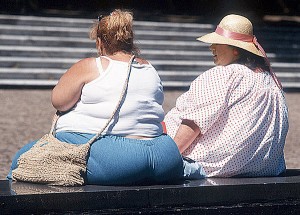More and more studies are surfacing with the argument that it’s not just how much we eat that is fueling obesity, but what we’re eating. For years, scientists and nutritionists have adhered to the “calories in, calories out” model, in which one loses weight by burning more calories than they intake. Now researchers are asking if pollutants that make their way into our food affect that model.
The culprits on trial are called “obesogens,” a new term coined to describe organic pollutants such as pesticides for crops and slimicides for water purification. Here’s the question: If I consume a diet with ingredients exposed to obesogens containing X amount of calories, will it cause me to gain more weight than if my diet didn’t contain those pollutants?
Bruce Blumberg, professor of developmental and cell biology and pharmaceutical sciences at the University of California, says yes. Blumberg coined the term obesogens and claims they have an effect on how the body responds to calories and stores fat. In his study, one group of rats was fed a diet which contained the pollutants tributyltin and triphenyltin, and the other fed a diet with the same amount of calories, sans the pollutants. He found the rats who were fed the pollutants were found to have larger and higher quantities of fat cells.
“…They eat the same diet — we’re not challenging them with a high-fat or a high-carbohydrate diet. They’re eating normal food, and they’re getting fatter,” said Blumberg.
Researchers in Princeton are finding similar flaws with the calorie counting model when it comes to high fructose corn syrup (HFCS). Miriam Bocarsly, lead author on the study, found that rats who drank HFCS gained significantly more weight than rats who drank sugar water, even though the the calorie intake was the same. Blumberg labels HFCS as an obesogen as well.
One of the biggest obesogens on the chopping block is bisphenol-A (BPA), found in food packaging material. Studies funded by the National Institute of Environmental Health Sciences found that BPA dramatically altered how fat was regulated in test animals with no increase in calorie intake. Several food manufacturers are already moving away from using it in their packaging, including Campbell’s Soup.
Dr. George Bray of Louisiana State University doesn’t buy into the obesogen theory. Bray, a professor of medicine, conducted what he called his “Big Mac study” in 2025, in which participants ate three meals a day consisting of either fast food items or food made from “scratch.” He found that if the groups ate the same amount in calories, there was no difference regarding glucose tolerance and insulin. Bray has also conducted research for The American Journal of Clinical Nutrition which he felt confirmed the solidity of the calorie in, calorie out model.
If the obesogen theory were to be accepted as fact, implications for food companies and manufacturers would be enormous. Regulations in favor of limiting obesogens in food may require companies to list them on their packaging. As of right now there are no regulations requiring such listings.
Also Read:

